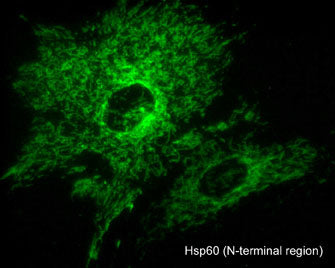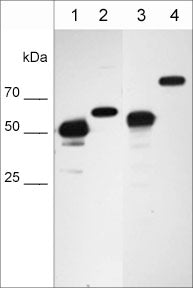Anti-Hsp60 (N-terminal region) Antibody
- 产品详情
- 实验流程
- 背景知识
Application
| WB, ICC |
|---|---|
| Primary Accession | P10809 |
| Host | Mouse |
| Clonality | Mouse Monoclonal |
| Isotype | IgG1 |
| Clone Names | M438 |
| Calculated MW | 61055 Da |
| Gene ID | 3329 |
|---|---|
| Other Names | Hsp |
| Target/Specificity | Heat shock proteins (Hsp) are a family of highly conserved proteins that include both constitutively expressed (Hsp60, Hsp70, and Hsp90) and stress-induced (Hsp27 and Hsp72) proteins. Hsp60 is a mitochondrial protein that promotes protein folding and facilitates proteolytic degradation of misfolded or denatured proteins in the mitochondria. Hsp10 interacts with Hsp60 to regulate its substrate binding and ATPase activity. In HeLa and Jurkat mitochondria, Hsp60 associates with caspase-3 to form a complex that dissociates and releases from the mitochondria during apoptosis. Hsp60 accelerates the maturation of procaspase-3 through its ATP-dependent “foldase” activity. In addition to its protein folding activity, Hsp60 can bind the toll-like receptor-4 complex leading to production of TNFα and stimulation of a pro-inflammatory response in macrophages. Thus, the protein folding function of Hsp60 is involved in protein folding in both normal and apoptotic cells, while release of Hsp60 during necrosis is thought to stimulate a pro-inflammatory response. |
| Dilution | WB~~1:1000 ICC~~N/A |
| Storage | Maintain refrigerated at 2-8°C for up to 6 months. For long term storage store at -20°C in small aliquots to prevent freeze-thaw cycles. |
| Precautions | Anti-Hsp60 (N-terminal region) Antibody is for research use only and not for use in diagnostic or therapeutic procedures. |
| Shipping | Blue Ice |
For Research Use Only. Not For Use In Diagnostic Procedures.
Provided below are standard protocols that you may find useful for product applications.
BACKGROUND
Heat shock proteins (Hsp) are a family of highly conserved proteins that include both constitutively expressed (Hsp60, Hsp70, and Hsp90) and stress-induced (Hsp27 and Hsp72) proteins. Hsp60 is a mitochondrial protein that promotes protein folding and facilitates proteolytic degradation of misfolded or denatured proteins in the mitochondria. Hsp10 interacts with Hsp60 to regulate its substrate binding and ATPase activity. In HeLa and Jurkat mitochondria, Hsp60 associates with caspase-3 to form a complex that dissociates and releases from the mitochondria during apoptosis. Hsp60 accelerates the maturation of procaspase-3 through its ATP-dependent “foldase” activity. In addition to its protein folding activity, Hsp60 can bind the toll-like receptor-4 complex leading to production of TNFα and stimulation of a pro-inflammatory response in macrophages. Thus, the protein folding function of Hsp60 is involved in protein folding in both normal and apoptotic cells, while release of Hsp60 during necrosis is thought to stimulate a pro-inflammatory response.
终于等到您。ABCEPTA(百远生物)抗体产品。
点击下方“我要评价 ”按钮提交您的反馈信息,您的反馈和评价是我们最宝贵的财富之一,
我们将在1-3个工作日内处理您的反馈信息。
如有疑问,联系:0512-88856768 tech-china@abcepta.com.























 癌症的基本特征包括细胞增殖、血管生成、迁移、凋亡逃避机制和细胞永生等。找到癌症发生过程中这些通路的关键标记物和对应的抗体用于检测至关重要。
癌症的基本特征包括细胞增殖、血管生成、迁移、凋亡逃避机制和细胞永生等。找到癌症发生过程中这些通路的关键标记物和对应的抗体用于检测至关重要。 为您推荐一个泛素化位点预测神器——泛素化分析工具,可以为您的蛋白的泛素化位点作出预测和评分。
为您推荐一个泛素化位点预测神器——泛素化分析工具,可以为您的蛋白的泛素化位点作出预测和评分。 细胞自噬受体图形绘图工具为你的蛋白的细胞受体结合位点作出预测和评分,识别结合到自噬通路中的蛋白是非常重要的,便于让我们理解自噬在正常生理、病理过程中的作用,如发育、细胞分化、神经退化性疾病、压力条件下、感染和癌症。
细胞自噬受体图形绘图工具为你的蛋白的细胞受体结合位点作出预测和评分,识别结合到自噬通路中的蛋白是非常重要的,便于让我们理解自噬在正常生理、病理过程中的作用,如发育、细胞分化、神经退化性疾病、压力条件下、感染和癌症。







